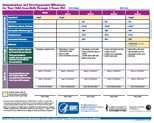Records & Requirements
Keeping up-to-date immunization records for your family, especially your children, is important. You will need your children’s immunization records to register them for school, child care, athletic teams, and summer camps or to travel.
Recording Immunizations
Good record-keeping begins with good record-taking. When you need official copies of immunizations records to enroll your child in child care, school, and summer camps or for international travel, they will be much easier to get if you have accurate, up-to-date personal records.
You can get an immunization tracking card from your child’s doctor or from your state health department to keep record of your child’s vaccines. Or, you can use CDC’s Immunization Tracker to record your children’s immunizations, developmental milestones, and growth from birth through 6 years old. You can also ask your doctor to record the vaccines your child has received in your state’s immunization registry.

Just like you keep track of your baby’s milestones as he grows, keep record of his vaccines and bring your record to each visit with his doctor.
Finding Official Immunization Records
CDC does not have immunization record information. If you need official copies of immunization records for your child or to update your personal records, there are several places you can look:
- Check with your child’s doctor or public health clinic. However, doctor’s offices and clinics may only keep immunization records for a few years.
- Check with your state’s health department. You can:
- Request a copy of your child’s immunization record.
- Ask if your child’s immunization record is in an immunization registry, or Immunization Information System (IIS). An IIS is a computer system your doctor or public health clinic may use to keep track of immunizations your child has received. Most states have an IIS; contact the IIS in the state where your child received their last shots to see if records exist. Find Your Child’s Immunization Record through Your State’s IIS.

Make sure you keep up-to-date personal vaccine records. Ask the doctor or nurse to record each vaccine given on your child’s immunization record and write down the name of the doctor’s office or clinic.
When you keep track of your child’s vaccines:- Keep your child’s immunization record in a safe place where you can easily locate it.
- Bring the record to each of your child’s doctor visits.
- Ask the doctor or nurse to record the vaccine given, date, and dosage on your child’s immunization record.
- Note where your child got the shot – knowing at which doctor’s office or clinic your child received a vaccine will help you get official records when you need them.
- Check with your child’s school. Some schools keep on file the immunization records of children who attended. However, schools generally keep these records for only a year or two after the student graduates, transfers to another school, or leaves the school system. After a student leaves the school system, schools send records to storage and they may not be able to access them unless they are stored in an IIS.
- Check with college medical or student health services for your college-age child. Many colleges provide vaccinations, especially those required for enrollment. Contact your college’s medical services or student health department for further information.
You can go to the Immunization Action Coalition’s site for more tips on locating old immunization records.
What To Do If You Can’t Find Your Child’s Immunization Records
If you cannot find your child’s vaccination records through your doctor or health department or their records are incomplete, your child should be considered susceptible to disease and should be vaccinated (or revaccinated). Children can have their blood tested for antibodies to determine their immunity to certain diseases. However, these tests may not always be accurate, so the doctor may not be sure your child is truly protected. In some cases, doctors may prefer to revaccinate your child for best protection. It is safe for your child to receive a vaccine, even if they may have already received it. Talk to your child’s doctor to determine what vaccines your child needs for protection against vaccine preventable diseases.
Immunization Records for Adoption and Foster Care
You should ask your adoption coordinator for your child’s immunization records. An internationally adopted child should be considered susceptible to disease and should be vaccinated (or revaccinated) against vaccine-preventable diseases if vaccination records are:
- lost,
- incomplete,
- difficult to understand, or
- if you or your child’s doctor thinks they are inaccurate.
Learn about vaccines for international adoption, domestic adoption, and care of foster children.
Interpreting Abbreviations on Records
To interpret commonly used acronyms and abbreviations that health care professionals use to record vaccinations, consult the Vaccine and Acronyms and Abbreviations list. This list also contains manufacturers’ trade names for vaccines and some common abbreviations for vaccine-preventable diseases.
Immunization Requirements for Child Care and School

Your state may require your child be vaccinated against certain diseases before entering child care or school. Check with your child’s doctor, your child’s school, or your health department to learn about your state requirements.
The CDC does not set immunization requirements for schools or childcare centers. Instead, each state decides which immunizations are required for your child’s enrollment and attendance at a childcare facility or school in that state.
Immunization requirements and allowable exemptions may vary by state and public health officials may update and change requirements regularly.
- Talk to a staff member to learn what vaccines the school or childcare facility requires. They will be able to provide you with specific information about their requirements.
- If you would like to know your state’s immunization requirements, contact your State’s Immunization Program or Department of Health.
- CDC also has a tool to help find more information about your state’s school vaccination requirements.
- Select your state under “Grantee” options.
- Select your child’s level [childcare, kindergarten, middle school, or university/college].
- Click “Get Results” to view your state’s vaccination requirements.
- Page last reviewed: September 27, 2017
- Page last updated: September 27, 2017
- Content source:


 ShareCompartir
ShareCompartir